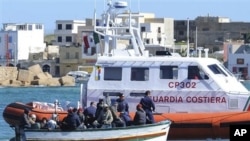The European Court of Human Rights ruled Thursday that it is a violation for states to collectively expel migrants intercepted on the high seas.
United Nations High Commissioner for Human Rights, Navi Pillay, who had submitted a legal brief in the case, cheered the Strasbourg-based court's decision.
Based on a suit lodged on behalf of 24 African migrants detained by Italian forces in 2009, Pillay's spokeswoman, Ravina Shamdasani, said the decision reaffirms rights of all migrants at sea.
"The court confirmed this position, ruling that the transfer of the applicants to Libya under the conditions at the time violated the prohibition on torture because it exposed the applicants to the risk of arbitrary return to their countries of origin," said Shamdasani.
The 11 Somali and 13 Eritrean nationals represented in the suit had left Libya in 2009 on board three boats headed for Italy. The Africans were part of a larger group of some 200 migrants, including children and pregnant women.
Italian customs and coastguard vessels picked up the Eritrean and Somali migrants outside Italian territorial waters, south of the Sicilian island of Lampedusa. They were transferred to Italian military vessels and taken directly to Libya's capital, Tripoli, where they were handed over to authorities.
The court agreed with the migrants' lawyer that these actions violated their human rights to seek political asylum.
"The court also ruled that the transfer violated the prohibition of collective expulsion of foreign nationals," said Shamdasani. "We have long expressed alarm at the interception and collective expulsion of migrants, often risking their lives on the high seas, without opportunity for an individual examination of their cases."
The migrants were returned to Libya in 2009 under terms of bilateral agreements between the governments of Italy’s then-President Silvio Berlusconi and Libya’s then-dictator Moammar Ghadafi.
Berlusconi initiated these agreements in an effort to stem the huge tide of immigration to Italy.
The United Nations estimates more than 1,000 migrants were forcibly returned to Libya by the Italian Coast Guard under Berlusconi’s so-called push-back policies, which have since been suspended.
The African migrants on behalf of whom the complaint was filed reportedly spent several months in Libyan prisons in the wake of their return.
According to Shamdasani, not much is presently known about their whereabouts now.
"I think they are scattered," she said. "I do not have full information about what happened to them, [but] I know they have ended up in various countries. One of them actually ended up back in Italy and got refugee status. But the others ended up in various different countries.”
High Commissioner Pillay is calling on all states to recognize and respect the fundamental rights of all migrants, which are guaranteed by international law. She is also urging states to base their migration policies on the human rights and protections enshrined in international law.
Top UN Official Applauds Court's Migrant Expulsion Ruling
- By Lisa Schlein




